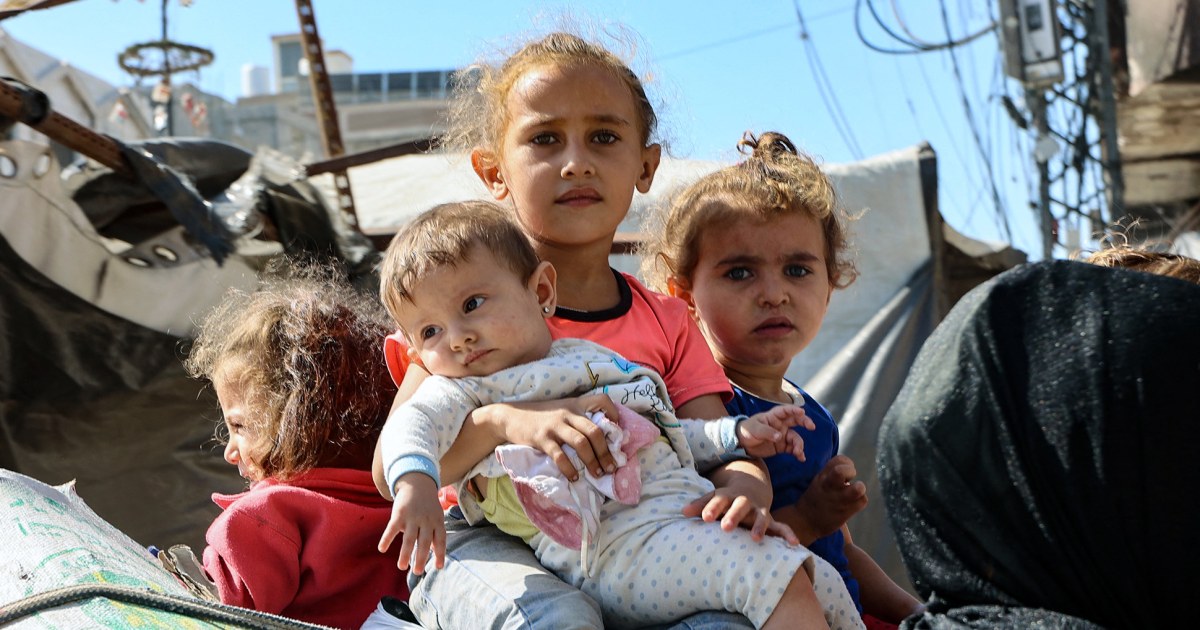Israeli officials were Wednesday scrutinizing an unusually stern letter from the U.S. government threatening to review military assistance to the government of Prime Minister Benjamin Netanyahu if it continued to block essential aid from entering the Gaza Strip.
While the departments of State and Defense will be reassured that, according to an Israeli official, the close American ally and recipient of $17.9 billion this year in U.S. military aid is taking American concerns seriously, the question remains: Is the United States able and willing to force Israel’s hand over its actions in the devastated Palestinian enclave?
“The reason that we haven’t had sufficient levels of humanitarian assistance throughout this entire period is in part there haven’t been consistent consequences for failing to meet those standards,” said Andrew Miller, former deputy assistant secretary for Israeli-Palestinian affairs at the State Department, who called the humanitarian situation in Gaza “a catastrophe.”
The lengthy letter from Secretary of State Anthony Blinken and Defense Secretary Lloyd Austin published by Axios on Tuesday, suggested that the U.S. would restrict weapons sales if the Israeli government did not allow more humanitarian aid into Gaza.
NBC News has not seen an original copy of the letter which was dated Sunday, sets out steps Israel must take within 30 days, including allowing a minimum of 350 trucks to enter Gaza each day, instituting humanitarian aid pauses in fighting and canceling needless civilian evacuation orders.
According to COGAT, the unit within the Israeli Defense Ministry responsible for civilian policy in Gaza, on Wednesday, 50 trucks carrying humanitarian aid including food, water, medical supplies and shelter equipment were allowed into the northern part of Gaza, although it did not say where that aid was distributed.
People involved in aid distribution in Gaza told NBC News that several trucks had entered Gaza City in the north of the enclave, but that aid had not been distributed elsewhere. NBC News has chosen not to name them for security reasons.
However, Scott Anderson, director of affairs for the United Nations Relief and Works Agency in Gaza, told a U.N. briefing in New York on Wednesday that his organization had “great difficulty” in getting aid to people in the north of the enclave. Since Sept. 30, he said, “only 12 trucks of food have actually made it to the population” through the Erez border crossing in northern Gaza.
While the U.N. only counts its own trucks, Israel includes commercial vehicles in its tallies.
Prior to Hamas’ Oct. 7 terror attacks, which killed around 1,200 people and saw some 250 taken hostage, around 500 trucks in total entered Gaza each day, according to the British Red Cross.
Over the past year, 90% of Gaza’s population has been internally displaced and more than 42,000 people have been killed there, according to figures from Gaza’s government-run health authorities. The enclave’s infrastructure and basic services have been almost completely destroyed, allowing for deadly diseases like polio to spread, and the threat of famine hangs over the population.
Not a threat?
White House national security spokesperson John Kirby on Tuesday insisted the letter from Austin and Blinken “was not meant as a threat.”
Sending such a message is something “you can do with your ally,” he said, adding that “it’s not the first time we’ve communicated that to Israel, but hopefully we won’t have to communicate it again.”
Charles Hollis, a former British diplomat to Saudi Arabia and Iran, says the letter was a kind of an ultimatum.
“There’s the diplomatic speak and there’s the real speak. It is some form of threat however you want to describe it,” he said.
It’s not the first time the Biden administration has tried this tack with the Israeli government. In a call with Netanyahu in April, Biden threatened to make support for Israel’s Gaza offensive conditional on it taking concrete steps to protect aid workers and civilians.
The State Department says U.S. pressure placed on Israel in April did work and humanitarian assistance increased. The administration hopes to see similar results this time.
This week’s letter, addressed to Israeli Defense Minister Yoav Gallant and Strategic Affairs Minister Ron Dermer, expressed U.S. concerns that Israeli government actions have contributed to rapidly deteriorating conditions in Gaza, where children this week began receiving a second round of polio vaccinations.
It comes as the Israeli military continues to fight on two fronts against Iran-backed militants, against Hamas in Gaza and Hezbollah in Lebanon, where an airstrike Wednesday on the southern town of Nabatieh killed at least six people, according to Reuters.
The shelling came despite the U.S. expressing its concerns to Netanyahu’s administration about strikes on the country.
Read the full article here

















